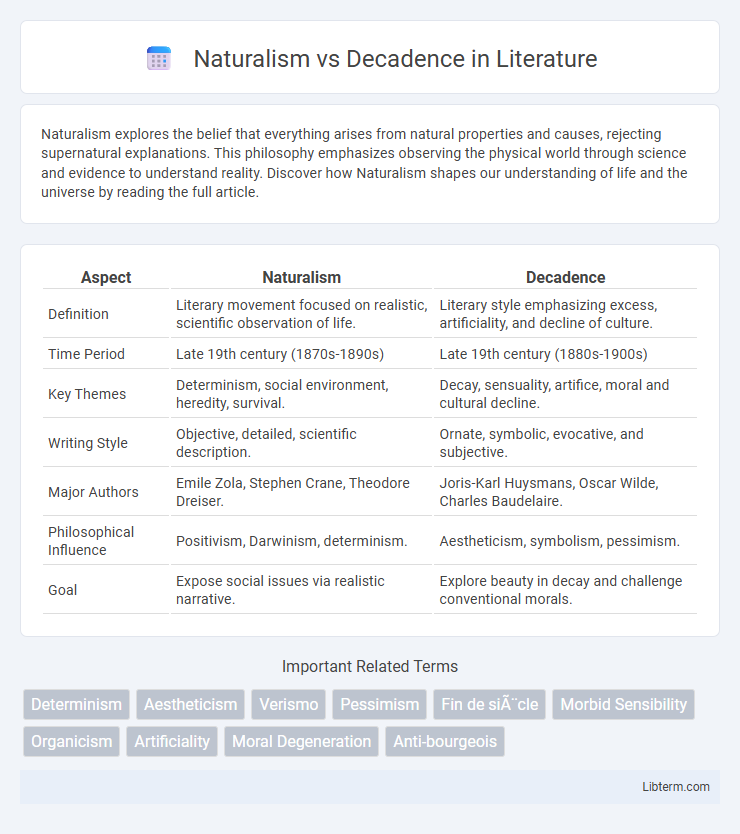Naturalism explores the belief that everything arises from natural properties and causes, rejecting supernatural explanations. This philosophy emphasizes observing the physical world through science and evidence to understand reality. Discover how Naturalism shapes our understanding of life and the universe by reading the full article.
Table of Comparison
| Aspect | Naturalism | Decadence |
|---|---|---|
| Definition | Literary movement focused on realistic, scientific observation of life. | Literary style emphasizing excess, artificiality, and decline of culture. |
| Time Period | Late 19th century (1870s-1890s) | Late 19th century (1880s-1900s) |
| Key Themes | Determinism, social environment, heredity, survival. | Decay, sensuality, artifice, moral and cultural decline. |
| Writing Style | Objective, detailed, scientific description. | Ornate, symbolic, evocative, and subjective. |
| Major Authors | Emile Zola, Stephen Crane, Theodore Dreiser. | Joris-Karl Huysmans, Oscar Wilde, Charles Baudelaire. |
| Philosophical Influence | Positivism, Darwinism, determinism. | Aestheticism, symbolism, pessimism. |
| Goal | Expose social issues via realistic narrative. | Explore beauty in decay and challenge conventional morals. |
Introduction to Naturalism and Decadence
Naturalism emerged in the late 19th century as a literary movement emphasizing observation and the depiction of everyday reality influenced by scientific principles, particularly determinism and social conditions. Decadence, contemporaneous with Naturalism, celebrated aestheticism, moral ambiguity, and the exploration of excess and decline, often rejecting conventional morality and realism. Both movements responded to the socio-cultural shifts of the era but diverged in their portrayal of human experience--Naturalism with objective analysis and Decadence with subjective indulgence.
Historical Background of Both Movements
Naturalism emerged in the late 19th century as a literary movement rooted in the deterministic philosophy of science, influenced by Darwinian theories and positivism, emphasizing objective, detailed depictions of everyday life and social conditions. Decadence arose concurrently in the same period, particularly flourishing in France during the 1880s, characterized by aestheticism, moral decline themes, and a fascination with excess, artifice, and sensuality, often seen as a reaction against industrialization and bourgeois values. Both movements reflect contrasting responses to modernity: Naturalism's focus on environmental and hereditary influences shaping human behavior contrasts with Decadence's exploration of individual sensibility, aestheticism, and the decline of societal norms.
Key Philosophical Differences
Naturalism emphasizes an objective representation of reality, grounded in determinism and scientific observation, portraying human behavior as influenced by environment and heredity. Decadence, by contrast, embraces subjectivity, aestheticism, and a rejection of conventional morality, highlighting themes of decline, excess, and artificiality. These philosophical differences reveal Naturalism's commitment to external reality and causality versus Decadence's focus on internal experience and cultural pessimism.
Literary Characteristics of Naturalism
Naturalism in literature emphasizes a detailed, unembellished portrayal of everyday life and human behavior, rooted in a deterministic view influenced by environment, heredity, and social conditions. It focuses on the darker aspects of existence, highlighting the struggles of ordinary people through objective narration and a scientific approach to character development. Naturalist works often depict characters as victims of their circumstances, portraying themes of survival, social inequality, and the influence of nature and society on human destiny.
Defining Features of Decadence
Decadence is characterized by an emphasis on artificiality, aesthetic excess, and a fascination with themes of decline, moral ambiguity, and sensual indulgence. It often explores the superficiality of culture and human experience, prioritizing style, irony, and symbolic imagery over realistic representation. Compared to Naturalism's detailed, objective portrayal of everyday life and social conditions, Decadence embraces subjectivity, exoticism, and an aesthetic pursuit of beauty in decay and moral transgression.
Influential Figures in Naturalism and Decadence
Emile Zola, a pivotal figure in Naturalism, emphasized scientific observation and social environment's impact on human behavior, shaping the movement's commitment to realism and empirical detail. Conversely, Oscar Wilde stands out in Decadence, his works glorifying aestheticism, individualism, and moral ambiguity, thus capturing the movement's rebellion against bourgeois values and traditional norms. Both movements' influential figures profoundly affected literature and art by advancing distinct worldviews: Naturalism's deterministic realism versus Decadence's celebration of artifice and excess.
The Role of Society and Environment
Naturalism emphasizes the deterministic influence of society and environment on human behavior, portraying individuals as products of genetic and social conditions beyond their control. Decadence, while acknowledging societal constraints, highlights personal decadence and moral decay as reactions against restrictive social norms and industrial progress. The role of environment in Naturalism is often depicted as harsh and unforgiving, shaping characters' fates, whereas Decadence explores the aesthetic and psychological responses to a decadent urban milieu marked by excess and decline.
Moral Perspectives and Aesthetics
Naturalism emphasizes a deterministic view of human behavior influenced by environment and heredity, often portraying characters with raw, unidealized morality. Decadence, contrastingly, explores aestheticism through artifice and moral ambiguity, celebrating beauty, excess, and the decline of traditional values. These movements diverge as Naturalism critiques societal flaws with ethical scrutiny, while Decadence revels in moral relativism and sensory experience.
Legacy and Impact on Modern Literature
Naturalism's legacy in modern literature lies in its unflinching exploration of social conditions, heredity, and determinism, influencing contemporary writers to adopt realistic and scientific approaches to character development. Decadence contributed to modern literature by championing aestheticism, symbolism, and a critique of moral decline, inspiring movements like Modernism and Postmodernism with its emphasis on individualism and stylistic innovation. Both movements collectively expanded literary boundaries, shaping diverse narrative techniques and thematic complexities found in 20th and 21st-century fiction.
Conclusion: Interplay and Divergence
Naturalism and Decadence both explore human experience but diverge in their portrayal: Naturalism emphasizes objective reality and social determinism, while Decadence highlights aestheticism and subjective excess. Their interplay reveals a tension between empirical observation and imaginative escapism, reflecting broader cultural shifts in the late 19th century. Understanding this divergence clarifies how literature negotiates between depicting societal conditions and expressing individual sensibilities.
Naturalism Infographic

 libterm.com
libterm.com